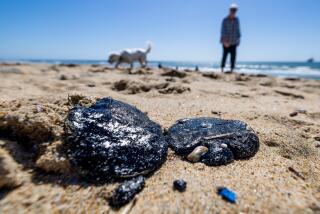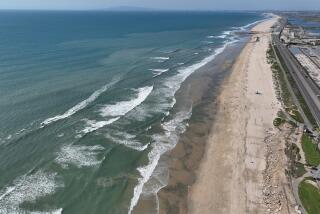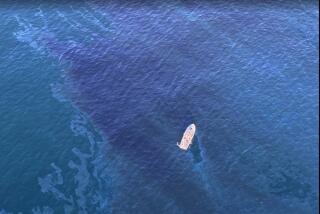No Surprises Due in Spill Report : Investigation: Coast Guard captain says the larger question of how to transport oil, to avoid repeats of the Huntington Beach accident, must be addressed by the state.
- Share via
MARINA DEL REY — No major revelations will come in the U.S. Coast Guard’s soon-to-be-issued report on the Feb. 7 Huntington Beach oil spill, but state policy on oil delivery procedures is still to be determined, Capt. James C. Card said Wednesday.
Card, who coordinated the Coast Guard-directed cleanup efforts at Huntington Beach, spoke at a daylong oil spill seminar at the Marina International Hotel here.
“Our investigation of this accident is complete, but it has not been released yet,” Card said. “It’s a fairly thick report. Basically what happened is that there wasn’t enough water (beneath the ship) as the ship came in.”
The 800-foot oil tanker American Trader apparently ran over its own anchor on Feb. 7 as it was preparing to offload at a marine mooring about a mile and a half off Huntington Beach. At the time, the cause of the accident was attributed to the ship’s being in shallow water, and Card said that is verified in the written report.
Card said no big surprises will come in the report, which is about the overall federal investigation of the accident. He said the report is likely to be made public sometime next week.
The Coast Guard has issued an order requiring annual depth-checking surveys of the ocean floor around the Huntington Beach offshore mooring, he said. But he said overall questions about oil delivery still remain to be addressed at the state level.
“The larger question . . . is how the state wants to treat (ocean delivery of) oil,” Card said. “As long as you use more than 2 million barrels of oil a day, and you import 1 million of that, you’re going to need to bring it in in some way. This may or may not be the most efficient way, but it’s the Coast Guard’s job to make sure it’s done as safely as possible.”
The State Lands Commission has jurisdiction over most of the offshore oil-delivery moorings in California, including the one 1.3 miles off Huntington Beach. So far the commission has issued no report or recommendations on the offshore moorings following the Feb. 7 oil spill. The Huntington Beach City Council on April 19 wrote the state commission, urging it to deny ships further use of the offshore mooring in that city.
Huntington Beach Mayor Thomas J. Mays, who was among the speakers at the oil spill seminar, said in an interview that the city still is waiting for the State Lands Commission to respond.
“Basically the ball is in their court,” Mays said.
The mayor added, “I guess they (the State Lands Commission) are still collecting information and evaluating our request. We want to get rid of that mooring. . . . There’s no reason for it to be there. It faces the open ocean, and it can be vulnerable to high seas. Even if you have a six-foot clearance (between ocean floor and ship bottom), if you have six- to eight-foot ocean swells, you’re going to have a ship bouncing up and down.
Mays said the safest thing to do is move the offshore moorings to a port, such as Long Beach.
The oil spill seminar was sponsored by the California Marine Parks and Harbors Assn., an Irvine-based private organization consisting primarily of small-craft boat owners.
Mays told the group that Huntington Beach was better able than most cities to handle a crisis like the oil spill because the city, since 1983, has had a disaster-preparedness plan. The city devised its plan following the heavy rains and floods there in 1983.
More to Read
Sign up for Essential California
The most important California stories and recommendations in your inbox every morning.
You may occasionally receive promotional content from the Los Angeles Times.













